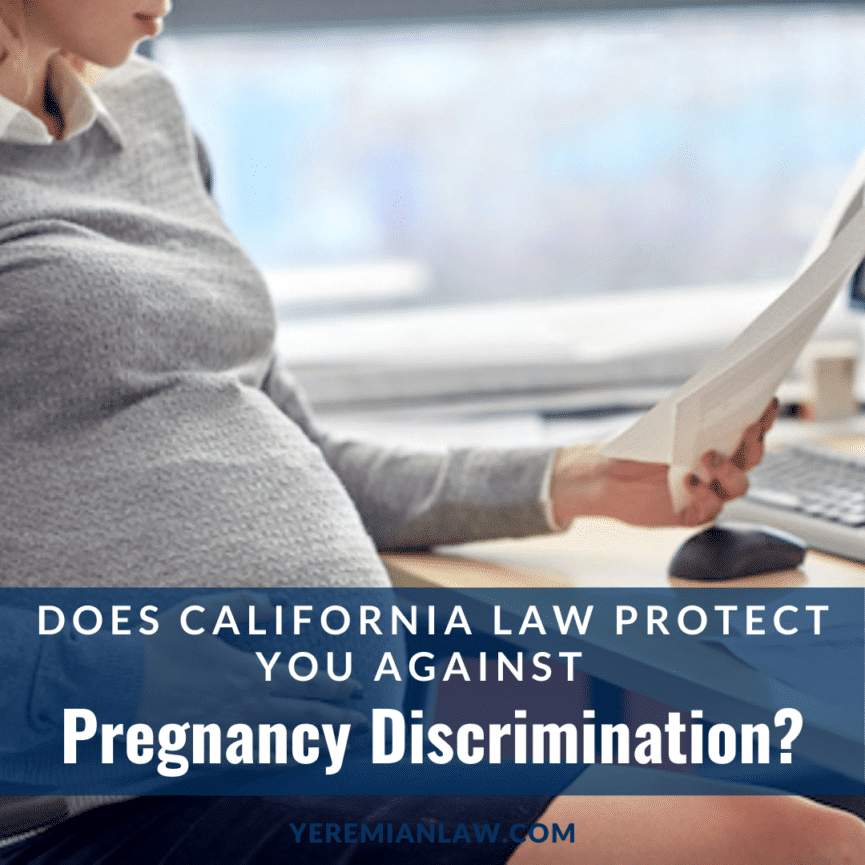If you’re like many people, you know that in many cases, California employment law provides more worker protections than federal law does. But are there any laws in California that protect pregnant workers?
Here’s what you need to know.
The Inside Scoop on Pregnancy Discrimination Laws in California
California law prohibits discrimination against pregnant women in a wide range of situations – in fact, the state considers it to be a form of sex discrimination.
In California, employers may not:
- Deny a woman time off for childbirth or medical conditions related to childbirth (if she’s legally entitled to that time)
- Discriminating against a woman because she’s breastfeeding or pumping, or because she’s treating medical conditions related to breastfeeding
- Fire or demote a woman because she experienced one or more medical conditions related to pregnancy
- Refuse to hire a woman because she may someday become pregnant
- Refuse to hire a woman because she’s pregnant
- Refuse to provide reasonable accommodations for a woman who has pregnancy-related disabilities
What Laws Are in Place in California to Protect Pregnant Workers?
The Pregnancy Discrimination Act is a federal law that prohibits employers from discriminating on the basis of pregnancy, childbirth or related medical conditions, and it requires employers to treat women under these conditions the same as all other employees are treated. This federal law only applies to employers with 15 or more employees, though – and that’s where state law steps in and provides additional protections.
California’s Fair Employment and Housing Act, or FEHA, covers companies that have five or more employees. Just like the Pregnancy Discrimination Act, FEHA prohibits discrimination on the basis of pregnancy and pregnancy-related conditions. It also requires employers to provide reasonable accommodations to employees who are disabled by a pregnancy, and in some cases, that means providing extended leave (time off that’s longer than what most people get for pregnancy).
There are other laws that specifically protect women’s right to time off for pregnancy and pregnancy-related conditions:
- The Family and Medical Leave Act, a federal law that applies to most California employers
- The California Fair Employment and Housing Act, or FEHA
- Pregnancy Disability Leave Law, a state law
- The California Family Rights Act, or CFRA
- The New Parent Leave Act
Each law provides varying – and sometimes overlapping – protections for expectant and new mothers (and in some cases, fathers), but they are all designed to provide unpaid leave so parents can spend time caring for new children.
Related: Pregnancy discrimination happens more often than you think
Proving Violations of Pregnancy Discrimination Laws in California
In order to prove that an employer unlawfully discriminated against a pregnant worker in California, an attorney must show:
- That the employer is governed by pregnancy discrimination laws in California (or by federal pregnancy discrimination laws)
- The employer took some kind of negative employment action against the worker (such as refusal to hire, refusal to make reasonable accommodations, or firing)
- The pregnancy, a pregnancy-related disability, or even the ability to become pregnant was the reason the employer took the negative employment action against the worker
- The employee suffered harm due to the employer’s negative employment action
If an attorney can show all of those things are true, you have a pregnancy discrimination case.
Related: Guide to pregnancy discrimination in California
Usually, discrimination in this context refers to treating an employee differently with respect to:
- Compensation
- Terms of employment
- Privileges of employment
- Working conditions
- Job assignments
- The hiring process
- The promotion process
- Making raise determinations
- Making decisions about firing and laying off employees
- Making decisions on training opportunities
Not all employers can be held liable, though. Federal laws related to pregnancy discrimination only apply to employers that have 15 or more employees, and California pregnancy discrimination laws apply to those with five or more employees. If an employer has fewer than five employees, they’re generally not subject to these laws. Additionally, some religious nonprofits and corporations aren’t considered employers for the purposes of these laws – and that means they can’t be held liable for pregnancy discrimination under federal or California law.
Related: What is an example of discrimination in the workplace?
Do You Need to Talk to a Lawyer About Pregnancy Discrimination Laws in California?
If you believe you’ve been discriminated against due to pregnancy, childbirth, or a pregnancy or childbirth-related medical condition, we may be able to help you. Call us at 818-230-8380 now to discuss your situation with an attorney in a free consultation. If it’s easier, fill out the form below and we’ll get back to you as soon as we can.





